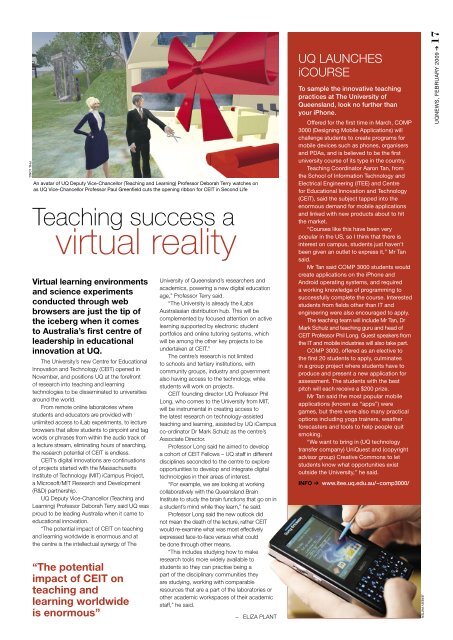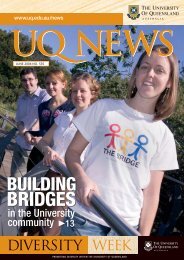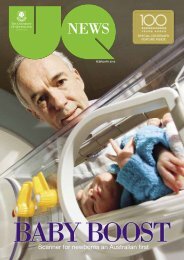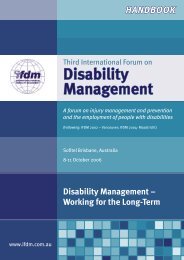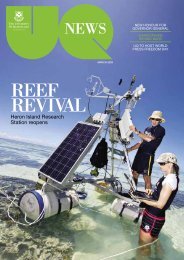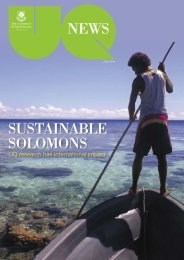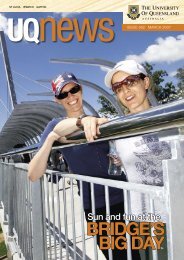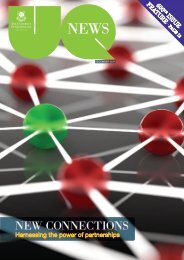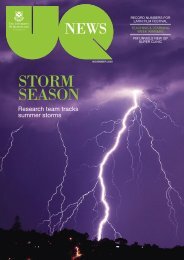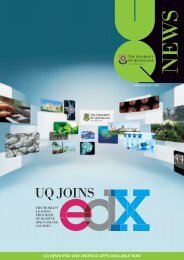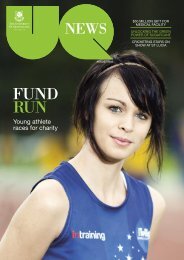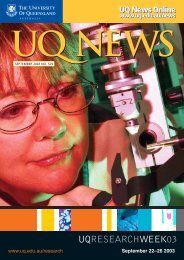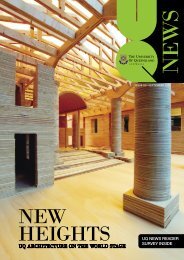Margaret Olley: Life's journey - Office of Marketing and ...
Margaret Olley: Life's journey - Office of Marketing and ...
Margaret Olley: Life's journey - Office of Marketing and ...
- No tags were found...
You also want an ePaper? Increase the reach of your titles
YUMPU automatically turns print PDFs into web optimized ePapers that Google loves.
PHIL LONGAn avatar <strong>of</strong> UQ Deputy Vice-Chancellor (Teaching <strong>and</strong> Learning) Pr<strong>of</strong>essor Deborah Terry watches onas UQ Vice-Chancellor Pr<strong>of</strong>essor Paul Greenfield cuts the opening ribbon for CEIT in Second LifeTeaching success avirtual realityVirtual learning environments<strong>and</strong> science experimentsconducted through webbrowsers are just the tip <strong>of</strong>the iceberg when it comesto Australia’s first centre <strong>of</strong>leadership in educationalinnovation at UQ.The University’s new Centre for EducationalInnovation <strong>and</strong> Technology (CEIT) opened inNovember, <strong>and</strong> positions UQ at the forefront<strong>of</strong> research into teaching <strong>and</strong> learningtechnologies to be disseminated to universitiesaround the world.From remote online laboratories wherestudents <strong>and</strong> educators are provided withunlimited access to iLab experiments, to lecturebrowsers that allow students to pinpoint <strong>and</strong> tagwords or phrases from within the audio track <strong>of</strong>a lecture stream, eliminating hours <strong>of</strong> searching,the research potential <strong>of</strong> CEIT is endless.CEIT’s digital innovations are continuations<strong>of</strong> projects started with the MassachusettsInstitute <strong>of</strong> Technology (MIT) iCampus Project,a Micros<strong>of</strong>t/MIT Research <strong>and</strong> Development(R&D) partnership.UQ Deputy Vice-Chancellor (Teaching <strong>and</strong>Learning) Pr<strong>of</strong>essor Deborah Terry said UQ wasproud to be leading Australia when it came toeducational innovation.“The potential impact <strong>of</strong> CEIT on teaching<strong>and</strong> learning worldwide is enormous <strong>and</strong> atthe centre is the intellectual synergy <strong>of</strong> The“The potentialimpact <strong>of</strong> CEIT onteaching <strong>and</strong>learning worldwideis enormous’’University <strong>of</strong> Queensl<strong>and</strong>’s researchers <strong>and</strong>academics, powering a new digital educationage,” Pr<strong>of</strong>essor Terry said.“The University is already the iLabsAustralasian distribution hub. This will becomplemented by focused attention on activelearning supported by electronic studentportfolios <strong>and</strong> online tutoring systems, whichwill be among the other key projects to beundertaken at CEIT.”The centre’s research is not limitedto schools <strong>and</strong> tertiary institutions, withcommunity groups, industry <strong>and</strong> governmentalso having access to the technology, whilestudents will work on projects.CEIT founding director UQ Pr<strong>of</strong>essor PhilLong, who comes to the University from MIT,will be instrumental in creating access tothe latest research on technology-assistedteaching <strong>and</strong> learning, assisted by UQ iCampusco-ordinator Dr Mark Schulz as the centre’sAssociate Director.Pr<strong>of</strong>essor Long said he aimed to developa cohort <strong>of</strong> CEIT Fellows – UQ staff in differentdisciplines seconded to the centre to exploreopportunities to develop <strong>and</strong> integrate digitaltechnologies in their areas <strong>of</strong> interest.“For example, we are looking at workingcollaboratively with the Queensl<strong>and</strong> BrainInstitute to study the brain functions that go on ina student’s mind while they learn,” he said.Pr<strong>of</strong>essor Long said the new outlook didnot mean the death <strong>of</strong> the lecture, rather CEITwould re-examine what was most effectivelyexpressed face-to-face versus what couldbe done through other means.“This includes studying how to makeresearch tools more widely available tostudents so they can practise being apart <strong>of</strong> the disciplinary communities theyare studying, working with comparableresources that are a part <strong>of</strong> the laboratories orother academic workspaces <strong>of</strong> their academicstaff,” he said.– ELIZA PLANTUQ LAUNCHESiCOURSETo sample the innovative teachingpractices at The University <strong>of</strong>Queensl<strong>and</strong>, look no further thanyour iPhone.Offered for the first time in March, COMP3000 (Designing Mobile Applications) willchallenge students to create programs formobile devices such as phones, organisers<strong>and</strong> PDAs, <strong>and</strong> is believed to be the firstuniversity course <strong>of</strong> its type in the country.Teaching Coordinator Aaron Tan, fromthe School <strong>of</strong> Information Technology <strong>and</strong>Electrical Engineering (ITEE) <strong>and</strong> Centrefor Educational Innovation <strong>and</strong> Technology(CEIT), said the subject tapped into theenormous dem<strong>and</strong> for mobile applications<strong>and</strong> linked with new products about to hitthe market.“Courses like this have been verypopular in the US, so I think that there isinterest on campus, students just haven’tbeen given an outlet to express it,” Mr Tansaid.Mr Tan said COMP 3000 students wouldcreate applications on the iPhone <strong>and</strong>Android operating systems, <strong>and</strong> requireda working knowledge <strong>of</strong> programming tosuccessfully complete the course. Interestedstudents from fields other than IT <strong>and</strong>engineering were also encouraged to apply.The teaching team will include Mr Tan, DrMark Schulz <strong>and</strong> teaching guru <strong>and</strong> head <strong>of</strong>CEIT Pr<strong>of</strong>essor Phil Long. Guest speakers fromthe IT <strong>and</strong> mobile industries will also take part.COMP 3000, <strong>of</strong>fered as an elective tothe first 20 students to apply, culminatesin a group project where students have toproduce <strong>and</strong> present a new application forassessment. The students with the bestpitch will each receive a $200 prize.Mr Tan said the most popular mobileapplications (known as “apps”) weregames, but there were also many practicaloptions including yoga trainers, weatherforecasters <strong>and</strong> tools to help people quitsmoking.“We want to bring in (UQ technologytransfer company) UniQuest <strong>and</strong> (copyrightadvisor group) Creative Commons to letstudents know what opportunities existoutside the University,” he said.INFO ➔ www.itee.uq.edu.au/~comp3000/JEREMY PATTENUQNEWS, FEBRUARY 2009 ➔ 17


